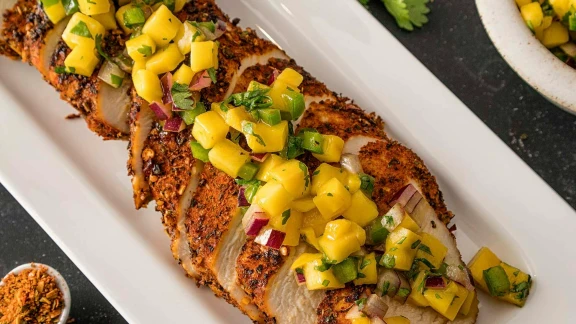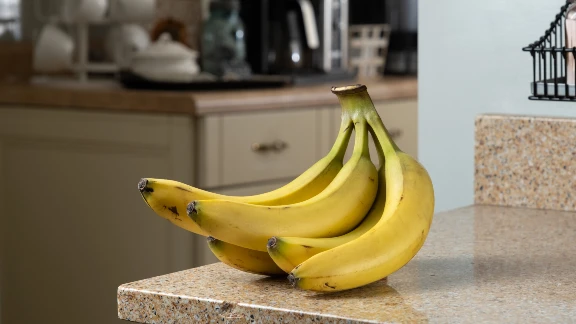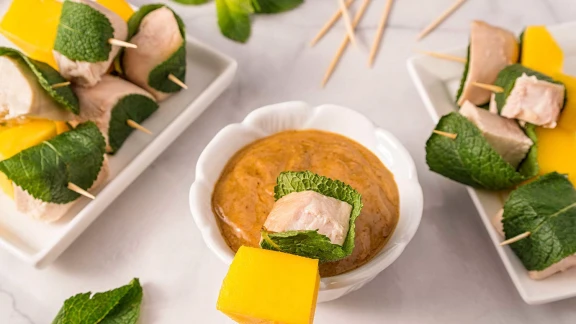Picture this: You’ve been craving Blackened Chicken with Mango Relish all day… only to come home and realize your mangos are still starchy and rock-hard. What’s a home chef to do?
We’ve got good news: While you may not be able to instantly ripen produce, you can speed up the process easily at home. Here’s how to accelerate fruit’s natural ripening process to get tender, ripe fruit at home.

How does fruit ripen?
As you know, fruit has its own natural ripening process. And while it can differ slightly from fruit to fruit, most produce ripens in the presence of an odorless gas called ethylene. The more ethylene, the faster the produce ripens. And the riper the produce, the more ethylene it produces.
That’s why the bananas on your counter can go from green to getting brown spots so quickly. As each banana ripens, it releases more and more ethylene to help ripen its neighbors — so each banana in the bunch helps ripen the others.

How to ripen fruit quickly at home
Thankfully, there’s one ultra-simple way to expose fruit to ethylene gas: Store it in a paper bag in a cool, dry place.. Putting produce in a bag significantly cuts down on air flow, trapping the ethylene inside to expedite ripening. If you want to speed up the process a little more, try adding a ripe apple or banana — it’ll pump out extra ethylene to ripen your fruit faster.
Depending on how ripe your produce was before the process, the paper bag method can ripen fruits in anywhere from a few hours to a few days. So if those mangoes are severely underripe, placing them in a paper bag a day or two before you need them will mean they’re ripe and juicy at meal time.
Tips for ripening fruit with a paper bag
1. Choose paper, not plastic
Unfortunately, you won’t get the same results with a plastic bag. While you want to reduce airflow to trap ethylene, you still want a breathable bag to let oxygen and carbon dioxide into and out of the bag. If you don’t have a paper bag on hand, try using fabric in a pinch.
2. Check your produce frequently
Several factors — including temperature, humidity and the type of fruit you’re ripening — impact how fast your produce ripens. So check the bag at least twice a day to ensure your produce doesn’t get overripe.
3. Choose the right produce
The paper bag method works for a range of produce, including:
- Mangoes
- Apples
- Bananas
- Pears
- Tomatoes
- Avocados
- Peaches
- Pineapples
- And more!
However, it doesn’t work for everything. Some fruits, like strawberries, stop ripening once they’re picked, and the paper bag method won’t ripen them. If you’ve got some seriously under-ripe strawberries, your best bet is to cook them to bring out their natural sugar.
Try these recipes with your newly ripe produce

Chicken Mango Satay
Sweet, savoury and deliciously creamy, these skewers work well as an entree or a crowd-pleasing app.
Mango Lassi Bars
Inspired by the traditional Indian drink, these yogurt bars are a must-serve all summer.
Seared Scallops with Red Grapefruit Avocado Salad
Scallops, grapefruit and avocado…need we say more? This simple-but-luxurious salad makes the ideal entree.
Banana Pudding
Homemade banana pudding is a perennial crowd-pleaser when you need a creamy, crunchy dessert.
Pear and Cranberry Crumble
This cool-weather crumble works perfectly on your Thanksgiving table or as a tasty final course on Sunday nights.
Maple Apple Grilled Cheese
Meet your favourite new weeknight comfort meal. This golden grilled cheese is sweet, smoky and utterly delicious.
Tomato Zucchini Saute
Perfectly ripened tomatoes add natural sweetness to this easy saute, which is sure to become your favorite summer side dish.








